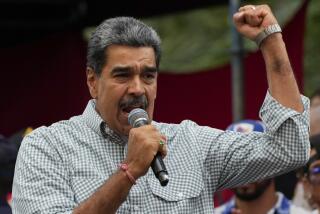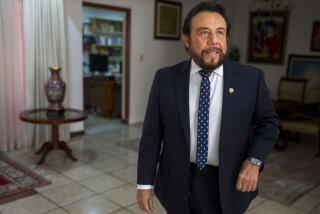Slain Salvador Rebel Chief Firmly Tied to Marine Deaths, Officer Says
- Share via
WASHINGTON — One of the Salvadoran guerrilla leaders slain in recent raids has been positively linked with the June 19 assassination of four U.S. Marines at a sidewalk cafe in San Salvador, Gen. Adolfo Blandon, chief of El Salvador’s armed forces, said Wednesday.
Defense Secretary Caspar W. Weinberger and other U.S. officials have described the Salvadoran army raids as retaliation for simultaneous terrorist attacks on two cafes, in which two American businessmen and nine Salvadorans also died.
At a news conference, Blandon said that a rebel identified as “Comandante Arnulfo,” killed by Salvadoran forces Aug. 4, had in his possession an audio cassette tape outlining plans for the machine-gun attack in San Salvador’s entertainment district.
But a U.S. official, speaking on the condition that he not be identified, cautioned that the identification of Arnulfo is still regarded as doubtful by some experts on El Salvador’s labyrinth of rebel organizations.
Blandon asserted that four leaders and 28 members of the Central American Workers’ Revolutionary Party have been killed in the retaliatory raids. The campaign against the guerrilla organization is being pursued in Usulutan province, where, according to other Salvadoran sources, the rebels are surrounded in mangrove swamps bordering the Pacific Ocean.
Two women guerrilla leaders--”Comandante Mendoza” and “Comandante Arlene”--reportedly were among those killed last month, according to a Salvadoran official who requested anonymity. In addition, he said, Nidia Dia, reputed to have been the Revolutionary Party’s top official, has been taken prisoner.
One of Least Known
Before the June 19 slayings, the party was one of the least known of the revolutionary factions in the troubled Central American nation. It is believed that its guerrillas staged the attack to win parity with better-known elements such as the People’s Revolutionary Army and the People’s Liberation Front.
Blandon described the military situation in El Salvador as “totally favorable” to the government.
When asked about urban attacks such as that on the Marines, a new development in the five-year Salvadoran civil war, he replied:
“For some time, the terrorists have been unable to obtain a victory in the country, and they have tried to move into the capital, trying to exploit the economic problems resulting from the war. This is part of a strategic plan. We’re preparing for all contingencies, and we may see more terrorism in the cities.”
More to Read
Sign up for Essential California
The most important California stories and recommendations in your inbox every morning.
You may occasionally receive promotional content from the Los Angeles Times.










